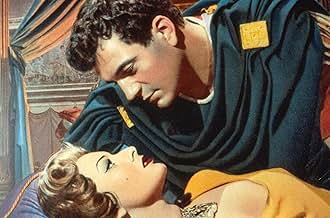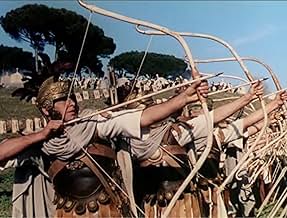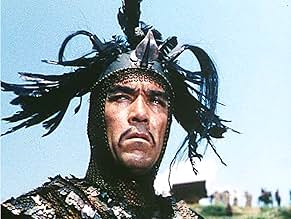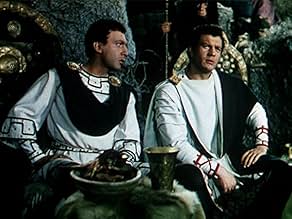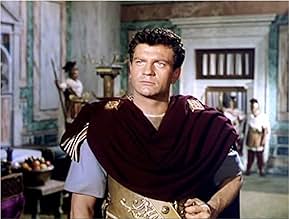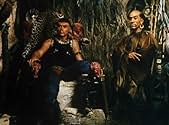अपनी भाषा में प्लॉट जोड़ेंAttila, the leader of the barbarian Huns and called by the Romans "The Scourge of God", sweeps onto the Italian peninsula, defeating all of the armies of Rome, until he and his men reach the... सभी पढ़ेंAttila, the leader of the barbarian Huns and called by the Romans "The Scourge of God", sweeps onto the Italian peninsula, defeating all of the armies of Rome, until he and his men reach the gates of the city itself.Attila, the leader of the barbarian Huns and called by the Romans "The Scourge of God", sweeps onto the Italian peninsula, defeating all of the armies of Rome, until he and his men reach the gates of the city itself.
Anthony Quinn
- Attila
- (as Anthony Qvinn)
Eduardo Ciannelli
- Onegesius - Counselor to Attila
- (as Eduardo Cianelli)
फ़ीचर्ड समीक्षाएं
An early sword-and-sandal epic from Italy casts Anthony Quinn as Attila the Hun, with dialog that sounds as though it came from a kung fu movie. "Attila" is probably most noticeable as an early appearance of Sophia Loren (she plays Honoria, who marries the vicious warrior). Otherwise, it's the sort of movie that belongs on "Mystery Science Theater 3000". At this point, I have serious doubts as to whether its even possible to make a good movie about a historical figure from that long ago. Maybe they just work best as spoofs in the vein of "Life of Brian".
Anyway, this is certainly the sort of flick that should be of interest to bad movie buffs. Not terrible, but that year, Anthony Quinn starred in one of Italy's greatest films: "La strada".
Anyway, this is certainly the sort of flick that should be of interest to bad movie buffs. Not terrible, but that year, Anthony Quinn starred in one of Italy's greatest films: "La strada".
Although not without its unintentionally funny moments, compared to most of the Sword and Sandal films that were churned out by Hollywood on the Tiber, this one is not at all bad.
Anthony Quinn's testosterone filled, Alpha male performance here certainly fits historian Edward Gibbon's description of Attila as 'a formidable barbarian' whilst the oestrogen of pneumatic Sophia Loren as Honoria practically leaps off the screen. Honoria was a tragic character who had the misfortune to be born the daughter of an emperor and to be treated miserably by her domineering mother but her one-dimensional portrayal here is par for the course in films of this type.
The year this film was released was notable for both Quinn and La Loren as he also appeared in a little opus entitled 'La Strada' and she was directed for the first time by Vittorio de Sica in the 'Pizza con credito' segment of 'L'Oro di Napoli' in which he brought out the Neapolitan earthiness and innate comedic ability that were to serve her so well through the years, not least in the amusing 'Peccato che sia una canaglia' from the same year which marked the first of her many films with a certain Marcello Mastroianni.
A good supporting cast, all of whom are adequately 'dubbed' comprises Colette Régis as the wilful Galla Placidia and Henri Vidal as Aetius. The emperor Valentinian III, described by Gibbon as 'feeble and dissolute', is convincingly played by Claude Laydu who will forever be associated with the title character of Bresson's 'Journal d'un curé de compagne'. Mention must be made of the wondrous Irene Papas in the minor role of one of Attila's many wives. She was to go from strength to strength, especially in classical Greek tragedy and utilised what one critic has called her 'elemental nobility' as the widow opposite Quinn's Zorba. For those interested in such things, neither Honoria nor Aetius met their ends in the manner depicted here.
Designed to warm the hearts of the Faithful, the final scene, complete with heavenly chorus and a crucifix in the sky, shows Attila being persuaded by Pope Leo not to attack Rome. It is not known what was said or indeed what inducements were offered but it is doubtful whether a heathen such as Attila would have been swayed by Leo's eloquence and sacerdotal robes alone and it is more likely that he turned back because of plague in his army, lack of food and the threat of Roman reinforcements from the East.
Oh well, as the man said, 'it's only a movie.'
Anthony Quinn's testosterone filled, Alpha male performance here certainly fits historian Edward Gibbon's description of Attila as 'a formidable barbarian' whilst the oestrogen of pneumatic Sophia Loren as Honoria practically leaps off the screen. Honoria was a tragic character who had the misfortune to be born the daughter of an emperor and to be treated miserably by her domineering mother but her one-dimensional portrayal here is par for the course in films of this type.
The year this film was released was notable for both Quinn and La Loren as he also appeared in a little opus entitled 'La Strada' and she was directed for the first time by Vittorio de Sica in the 'Pizza con credito' segment of 'L'Oro di Napoli' in which he brought out the Neapolitan earthiness and innate comedic ability that were to serve her so well through the years, not least in the amusing 'Peccato che sia una canaglia' from the same year which marked the first of her many films with a certain Marcello Mastroianni.
A good supporting cast, all of whom are adequately 'dubbed' comprises Colette Régis as the wilful Galla Placidia and Henri Vidal as Aetius. The emperor Valentinian III, described by Gibbon as 'feeble and dissolute', is convincingly played by Claude Laydu who will forever be associated with the title character of Bresson's 'Journal d'un curé de compagne'. Mention must be made of the wondrous Irene Papas in the minor role of one of Attila's many wives. She was to go from strength to strength, especially in classical Greek tragedy and utilised what one critic has called her 'elemental nobility' as the widow opposite Quinn's Zorba. For those interested in such things, neither Honoria nor Aetius met their ends in the manner depicted here.
Designed to warm the hearts of the Faithful, the final scene, complete with heavenly chorus and a crucifix in the sky, shows Attila being persuaded by Pope Leo not to attack Rome. It is not known what was said or indeed what inducements were offered but it is doubtful whether a heathen such as Attila would have been swayed by Leo's eloquence and sacerdotal robes alone and it is more likely that he turned back because of plague in his army, lack of food and the threat of Roman reinforcements from the East.
Oh well, as the man said, 'it's only a movie.'
The script is admittedly very badly written but it follows roughly Attila 's biography.Of course ,as it is a 75 min movie,many moments are passed over in silence but all that concerns the main characters is accurate: the brother was slain by Attila and his German vassals ,Honoria tried to forge an alliance with him,(but her brother locked her into a convent),and yes,the pope found the right words to stop the conqueror.He had previously failed in front of Paris ,reportedly with a little help from Saint Genevieve ,a woman of God who urged the Parisians to resist.
The film suffers from an international ill-assorted cast:an American (Quinn) ideally cast as the bar bar,an Italian (Sophia Loren) which made sense,but also a Greek thespian (Irene Pappas) plus three French actors :Henri Vidal cast as the noble loyal hero- a character not unlike the legionnaire he played in "Fabiola"-,who was formerly Attila's good friend (?),Claude Laydu who gives a passable performance of an effeminate fearful emperor ,probably influenced by Peter Ustinov's masterful portrayal of Nero in Mervyn Le Roy's "Quo Vadis" ,Colette Régis,an obscure actress plays his mother ,an over possessive one of course.
Also handicapped by a last scene which verges on Christian propaganda -the last picture is revealing-,the film is to recommend only for Quinn's fans.
The film suffers from an international ill-assorted cast:an American (Quinn) ideally cast as the bar bar,an Italian (Sophia Loren) which made sense,but also a Greek thespian (Irene Pappas) plus three French actors :Henri Vidal cast as the noble loyal hero- a character not unlike the legionnaire he played in "Fabiola"-,who was formerly Attila's good friend (?),Claude Laydu who gives a passable performance of an effeminate fearful emperor ,probably influenced by Peter Ustinov's masterful portrayal of Nero in Mervyn Le Roy's "Quo Vadis" ,Colette Régis,an obscure actress plays his mother ,an over possessive one of course.
Also handicapped by a last scene which verges on Christian propaganda -the last picture is revealing-,the film is to recommend only for Quinn's fans.
It's very hard to make a film about Attila and his times because if you want to make it historically accurate, well, that's not a simple thing. There are many Church traditions about Attila and his eventual sparing of Rome but historians of the day were notorious for shaping it to make themselves or their leaders look best. It is what it is...or was. So, it's difficult to say exactly what Attila did....such as the death of his brother...of which are contradictory accounts. This version of his latter days is based mostly on Church traditions.
Like many films of the 1950s and 60s, European filmmakers hired a famous American actor to star in the production. In this case, Anthony Quinn plays Attila the Hun...and he also appeared in a few other European films, such as Fellini's "La Strada". And, Quinn was then dubbed into Italian...as most of the actors in the film are Italians (though it's a French-Italian co-production).
The story is set from the period in which Attila agreed to a substantial bribe by the Romans not to destroy the Empire. Shortly after this, Attila reneged on the agreement and a long strong of bloody battles resulted. This film dramatizes this period and offers a traditional view as to why he spared Rome.
The film is well made and entertaining....it just isn't perfect history because of all the speculation. But this is NOT a reason to skip the film. It's well worth your time and it's also nice to see Sophia Loren in a supporting role early in her film career.
By the way, although the acting was generally good, the character Emperor Valentinian III seemed a bit overacted. Perhaps I'm wrong...he just didn't seem all that realistic.
Like many films of the 1950s and 60s, European filmmakers hired a famous American actor to star in the production. In this case, Anthony Quinn plays Attila the Hun...and he also appeared in a few other European films, such as Fellini's "La Strada". And, Quinn was then dubbed into Italian...as most of the actors in the film are Italians (though it's a French-Italian co-production).
The story is set from the period in which Attila agreed to a substantial bribe by the Romans not to destroy the Empire. Shortly after this, Attila reneged on the agreement and a long strong of bloody battles resulted. This film dramatizes this period and offers a traditional view as to why he spared Rome.
The film is well made and entertaining....it just isn't perfect history because of all the speculation. But this is NOT a reason to skip the film. It's well worth your time and it's also nice to see Sophia Loren in a supporting role early in her film career.
By the way, although the acting was generally good, the character Emperor Valentinian III seemed a bit overacted. Perhaps I'm wrong...he just didn't seem all that realistic.
Destroying towns and cities across the Alp to Italy, the mounted hordes led by Attila, King of the Huns, reached the gates of Rome where they were stopped by the Cross and turned back by Pope Leo I...
Anthony Quinn is Attila, the infamous 5th Century barbarian in this Italian unworthy spectacular...
Sophia Loren offers a pretty presence as the ambitious tempting Honoria who accepts Attila as a husband just to save Rome... She loses her life and half of her kingdom...
Quinn tries his best in his portrayal of the infamous Attila, but the script is bad and unreasonable...
Anthony Quinn is Attila, the infamous 5th Century barbarian in this Italian unworthy spectacular...
Sophia Loren offers a pretty presence as the ambitious tempting Honoria who accepts Attila as a husband just to save Rome... She loses her life and half of her kingdom...
Quinn tries his best in his portrayal of the infamous Attila, but the script is bad and unreasonable...
क्या आपको पता है
- ट्रिवियाAnthony Quinn worked on La strada (1954) simultaneously with this movie. He remarked that it had a much smaller budget than the Attila epic, but considered it a much better film.
- क्रेज़ी क्रेडिटAlthough this was an Italian co-production shot in Italy, Eduardo Ciannelli's name is misspelled in the credit.
- कनेक्शनFeatured in Soldiers: Cavalry (1985)
टॉप पसंद
रेटिंग देने के लिए साइन-इन करें और वैयक्तिकृत सुझावों के लिए वॉचलिस्ट करें
- How long is Attila?Alexa द्वारा संचालित
विवरण
बॉक्स ऑफ़िस
- बजट
- ITL 45,00,00,000(अनुमानित)
- चलने की अवधि
- 1 घं 20 मि(80 min)
- पक्ष अनुपात
- 1.37 : 1
इस पेज में योगदान दें
किसी बदलाव का सुझाव दें या अनुपलब्ध कॉन्टेंट जोड़ें

